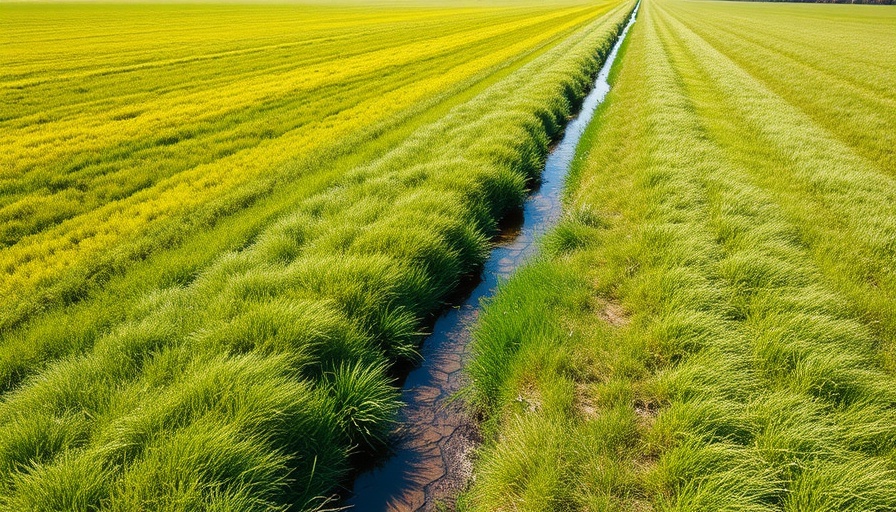
Growing Water Restrictions: The Impact of Drought on Agriculture
As the remnants of summer linger, farmers across Brabant and Limburg are bracing themselves for tightened water regulations due to a continuing dry spell. Waterschap Aa en Maas and Waterschap Limburg have announced the expansion of existing water extraction bans, dramatically affecting agricultural practices. On June 26, the Aa en Maas region implemented a ban on extracting water from local waterways, a response to falling water levels and quality.
These restrictions, which apply to intensive agricultural sectors such as fruit and vegetable farming, prohibit the use of surface water. This measure will significantly challenge producers who rely on irrigation during critical growth periods. Meanwhile, Waterschap Limburg will introduce a broader ban starting on August 27, impacting both capital-intensive and non-capital-intensive crops.
Why These Restrictions Matter
The broad-reaching implications of these bans are rooted in the need to protect local ecosystems. Water levels in ditches and streams have plummeted due to an unrelenting lack of rain, leading to the deterioration of water quality. To maintain the ecological balance and ensure adequate water supply for local habitats, these bans are essential, despite the economic pressures they impose on farmers.
The reality for many farmers is stark; the inability to irrigate crops not only threatens yield but also the viability of their businesses. Farmers must adapt quickly, seeking alternative water sources or adjusting crop choices to mitigate losses.
Historical Context: Lessons from Past Droughts
This isn’t the first time farmers have faced challenges due to drought. Historical data shows a trend where water scarcity in the region has led to similar bans and restrictions, usually aligned with adverse weather patterns. Understanding past responses to drought can provide critical insights into effective strategies for mitigating these effects in the future.
Future Predictions: What Lies Ahead for Agriculture?
Looking forward, experts predict increasing instances of drought across the region, putting continuous pressure on water resources. Agriculture, being heavily reliant on predictable weather patterns, will need to adopt more resilient farming practices. Innovative techniques such as rainwater harvesting, or implementing drought-resistant crop varieties may become more prevalent as farmers adjust to the reality of climate change.
Counterarguments: Balancing Economic Need and Environmental Protection
While the necessity of these water restrictions is clear, there are dissenting voices among agricultural stakeholders. Some argue that the economic impact on farmers could lead to severe consequences for the local economy, especially in rural areas where agriculture is a primary livelihood. This tension between environmental preservation and economic sustainability highlights the complexity of managing resources in times of crisis.
Actionable Insights for Farmers
For farmers caught in the middle of these regulations, taking proactive steps is essential. Establishing a water management plan is crucial, which could involve:
- Utilizing efficient irrigation techniques, such as drip irrigation, to reduce overall water usage.
- Exploring alternative water sources, such as underground aquifers, while ensuring they remain in compliance with regulations.
- Investing in drought-resistant crops that require less water without compromising yield.
By adopting these measures, farmers can navigate the challenges posed by drought while maintaining the health of their crops and the sustainability of their practices.
The Bigger Picture: Community Collaboration
As these water restrictions take shape, community collaboration will be vital. Local agricultural associations and water management authorities must work closely to develop shared strategies that not only comply with water laws but also support farmers through this difficult time. Programs that educate farmers on sustainable practices and provide resources for transitioning to less water-intensive methods could play a vital role.
Conclusion: Embracing Sustainable Practices
The expansion of water extraction bans triggered by ongoing drought underscores the urgent need for sustainable agriculture in Brabant and Limburg. As farmers, we must advocate for policies that understand both the ecological importance of water conservation and the economic realities of farming life. Implementing innovative strategies not only ensures immediate compliance but also sets the stage for a resilient agricultural future.
 Rij toevoegen
Rij toevoegen






Write A Comment